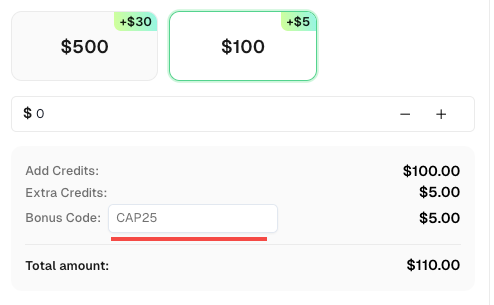AI Powered SEO Automation: How to Solve Captcha for Smarter SERP Data Collection

Emma Foster
Machine Learning Engineer
23-Oct-2025
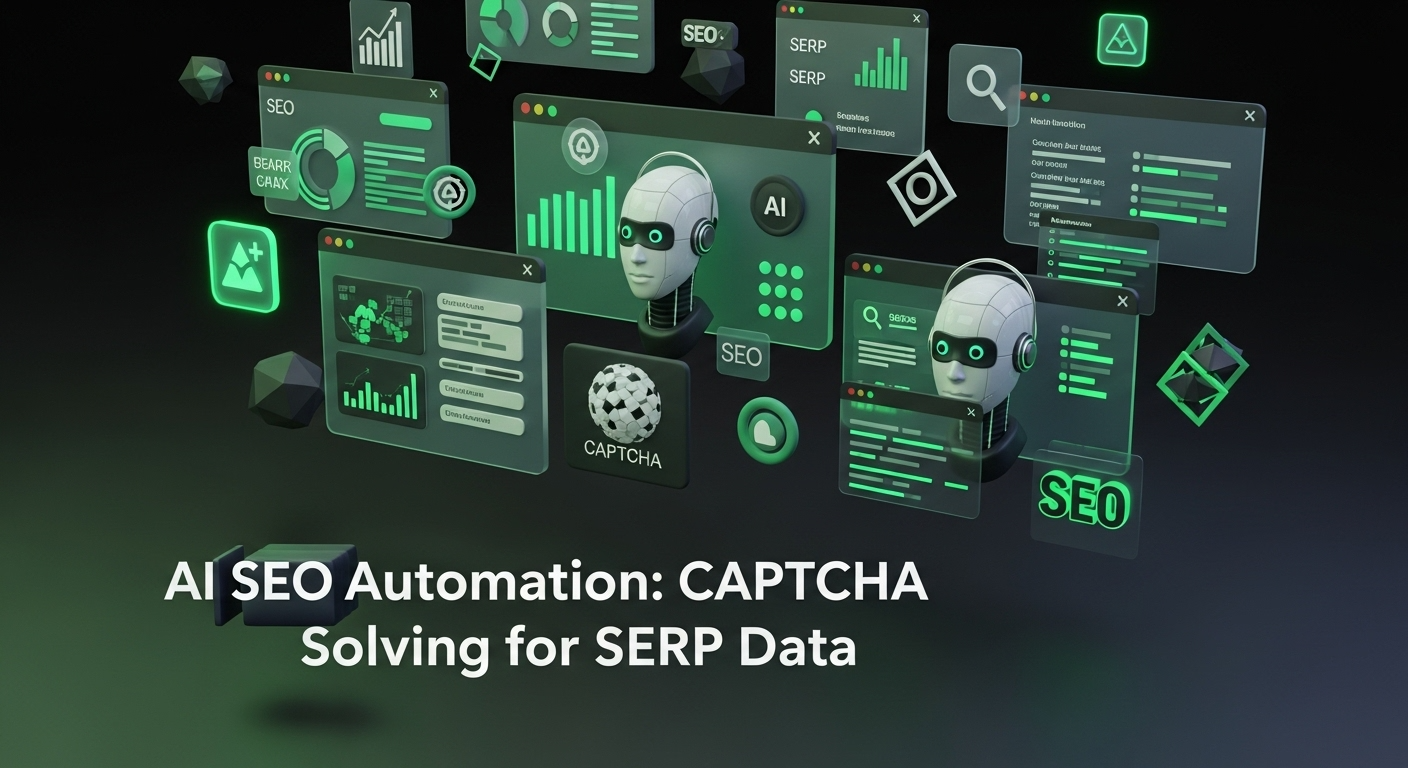
The quest for smarter, more efficient SERP data collection often hits a formidable wall: CAPTCHAs. This article will guide you through the intricacies of CAPTCHA challenges in AI-powered SEO automation, highlighting why traditional methods fall short and how advanced AI-driven solutions, particularly CapSolver , offer a robust path to uninterrupted, intelligent data gathering. Our goal is to equip SEO professionals, data engineers, and developers with the knowledge to overcome these barriers, ensuring your automation efforts yield precise and timely insights.
Introduction
large-scale SERP data collection is essential for tracking rankings and analyzing competitors. Yet automated crawlers often face CAPTCHA barriers that disrupt data flow and reduce efficiency. This article explores why CAPTCHAs appear, why traditional bypass methods fail, and how AI-powered solvers like CapSolver enable seamless, intelligent SERP data collection.
Claim Your CapSolver Bonus
Boost your automation performance with a quick bonus! Use the promo code CAP25 when adding funds to your CapSolver account to get an extra 5% credit on every recharge — with no limit. Start optimizing your CAPTCHA-solving workflow today!
Why Automated SEO Tasks Trigger CAPTCHA Challenges
Automated requests are often flagged by sophisticated anti-bot systems that meticulously analyze various parameters, including request velocity, IP reputation, and behavioral anomalies. Search engines, particularly Google, deploy advanced defense mechanisms to safeguard their infrastructure from abuse and maintain a high-quality experience for human users. When your SEO automation scripts interact with SERPs, several factors can trigger a CAPTCHA challenge, bringing your data flow to an abrupt halt. Understanding these triggers is the foundational step toward effective mitigation.
High Request Velocity and Rate Limiting
One of the most common triggers for security systems is a high volume of requests originating from a single source within a short timeframe. This pattern immediately signals automated activity. Rate-limiting mechanisms are specifically designed to prevent server overload and aggressive data extraction. For instance, a study by Imperva found that automated bots accounted for 64% of all internet traffic in 2023, with a significant portion being malicious or undesirable. Such statistics underscore why search engines are vigilant against high-velocity requests, often leading to CAPTCHA deployment to slow down or block automated access.
IP Reputation and Origin
The source of your traffic undergoes rigorous scrutiny, with certain IP addresses inherently raising more suspicion. IP addresses associated with data centers, Virtual Private Networks (VPNs), or known botnets are frequently flagged proactively. While clean, high-quality residential or mobile proxies are crucial for distributing load and masking origin, they alone do not constitute a complete solution. IP reputation remains a critical factor, and even with robust proxy management, CAPTCHAs can still be triggered if other behavioral anomalies are detected.
Behavioral and Fingerprinting Discrepancies (reCAPTCHA v3)
Google's invisible reCAPTCHA v3 system operates silently in the background, meticulously analyzing user behavior to assign a risk score. Automated scripts often exhibit unnaturally consistent or rapid interactions, such as precise mouse movements, instantaneous form submissions, or a lack of natural browsing patterns. Furthermore, a deficiency in complex browser fingerprinting—details like WebGL rendering, font lists, and specific JavaScript execution—makes it easier for the system to identify non-human traffic. This sophisticated behavioral analysis poses the most significant challenge for modern SEO automation, as a low reCAPTCHA v3 score can lead to invisible blocking or increased visible challenges.
Traditional CAPTCHA Bypass Methods: A Losing Battle
The ongoing arms race between automation and anti-bot technologies has rendered many historical CAPTCHA solving techniques obsolete or highly unstable. Relying on outdated methods like simple IP rotation and basic browser automation is not only resource-intensive but also increasingly ineffective against the advanced behavioral detection capabilities of modern reCAPTCHA. These approaches often lead to high maintenance costs, inconsistent data collection, and ultimately, a compromised SEO strategy.
Proxy Pools and IP Rotation Limitations
While indispensable for distributing request load and avoiding IP-based blocking, proxy pools alone cannot resolve the fundamental CAPTCHA challenge. Even with a vast pool of rotating IP addresses, the underlying request often lacks the necessary behavioral and fingerprinting characteristics to achieve a high trust score. High-quality residential proxies are costly, and lower-quality proxies are frequently blacklisted, making this an expensive and incomplete strategy for robust SEO automation. A comprehensive solution requires more than just IP obfuscation.
Browser Automation Overhead (Selenium/Puppeteer)
Tools such as Selenium and Puppeteer are capable of simulating human interaction by controlling a headless browser. However, deploying multiple browser instances for large-scale SERP scraping demands substantial CPU and memory resources, severely limiting scalability. Moreover, advanced detection systems can still identify the tell-tale signs of automated browser control, such as the presence of the WebDriver property or predictable interaction patterns, leading to low reCAPTCHA v3 scores and subsequent blocking. For more details on avoiding detection The constant need for script updates to adapt to evolving detection methods also results in significant maintenance overhead. The constant need for script updates to adapt to evolving detection methods also results in significant maintenance overhead.
Delays and Randomization
Introducing random delays between requests and randomizing User-Agent strings can make automated traffic appear more human-like, reducing the immediate triggers for CAPTCHAs. While these techniques are a necessary complement to any automation strategy, they are merely obfuscation methods and do not directly solve the underlying CAPTCHA challenge. They can mitigate the frequency of challenges but do not provide a definitive solution for bypassing them when they do appear. They are part of a good scraping hygiene but not a standalone solution for CAPTCHA resolution.
Comparison Summary: Traditional vs. AI-Powered CAPTCHA Solving
The shift from simple image-based CAPTCHAs to invisible, behavioral scoring systems necessitates a fundamental change in strategy. AI-powered services offer a distinct advantage in terms of reliability, speed, and scalability for SEO automation.
| Feature | Traditional Methods (Proxies/Selenium) | AI-Powered CAPTCHA Solvers (CapSolver) |
|---|---|---|
| Primary Focus | Obfuscation (IP/User-Agent) & Simulation | Direct Token Resolution via AI/ML |
| reCAPTCHA v2 Success | Moderate (Requires complex simulation) | High (95%+ success rate) |
| reCAPTCHA v3 Score | Low (Difficult to mimic human behavior) | High (Achieves human-like scores consistently) |
| Scalability | Low (Resource-intensive browser instances) | High (API-based, minimal local resources) |
| Maintenance | High (Constant script updates required) | Low (Service handles algorithm updates) |
| Cost Model | High fixed cost (Proxies, server resources) | Pay-per-solve (Cost-effective at scale) |
The Modern Solution: AI-Driven CAPTCHA Solver APIs
For truly reliable and scalable SEO automation, integrating a specialized AI-driven CAPTCHA solver API represents the most effective and cost-efficient approach. These services expertly offload the complex task of reCAPTCHA resolution to external, continuously updated machine learning models. This strategic outsourcing allows your core automation scripts to concentrate solely on data extraction, ensuring high uptime, superior data integrity, and ultimately, smarter SERP data collection.
Introducing CapSolver: Your Go-To Automation Ally
CapSolver stands out as a leading CAPTCHA solver API designed to tackle the full spectrum of challenges, including reCAPTCHA v2, reCAPTCHA v3, and even Enterprise versions. Its high success rate and rapid response times are critical for time-sensitive SEO tasks like real-time SERP monitoring and large-scale data acquisition. By leveraging advanced AI and machine learning, CapSolver consistently achieves the high behavioral scores required to solve reCAPTCHA v3 without human intervention, making it an indispensable tool for AI powered SEO automation.
Practical Application: Solving reCAPTCHA in AI SEO Scenarios
Integrating a solver service typically involves a two-step API process: creating a task with the site parameters and then polling for the solved token. This versatile approach can be applied across numerous SEO-related automation tasks, from detailed keyword rank tracking to comprehensive content indexing, ensuring smarter SERP data collection.
Case Study 1: Automated Keyword Rank Tracking at Scale
A large digital marketing agency needs to track the daily ranking of 10,000 keywords across various search engine results pages for hundreds of clients. Without an effective CAPTCHA solver, the sheer volume of requests would rapidly trigger reCAPTCHA challenges, leading to incomplete data, significant delays, and inaccurate reporting. By integrating CapSolver, the agency can programmatically solve these challenges as they appear, ensuring a complete and timely dataset. This reliable data is essential for making informed SEO strategy adjustments and providing accurate performance reports to clients.
Case Study 2: Competitive SERP Feature Analysis
An SEO data science team is developing a model to analyze the prevalence and evolution of SERP features (e.g., featured snippets, People Also Ask boxes, image carousels) for a high-value set of queries. This task requires continuous, high-frequency scraping, where the behavioral detection of reCAPTCHA v3 presents a major hurdle. Utilizing CapSolver's ReCaptchaV3TaskProxyLess service, the team can achieve a high trust score for each request, allowing their scraper to operate at scale without being flagged or blocked. This ensures they gather comprehensive data on how competitors are leveraging various SERP elements.
Code Reference: Integrating CapSolver for reCAPTCHA v2 and v3
The CapSolver API utilizes a straightforward createTask and getTaskResult pattern, easily implementable in any programming language. Below are Python examples, referencing the official CapSolver documentation, demonstrating how to solve both reCAPTCHA v2 and v3 for smarter SERP data collection.
python
import requests
import time
# Your CapSolver API Key
CAPSOLVER_API_KEY = "YOUR_CAPSOLVER_API_KEY"
def create_capsolver_task(api_key, task_type, website_url, website_key, page_action=None, invisible=False):
"""Creates a reCAPTCHA solving task with CapSolver."""
task_payload = {
"type": task_type,
"websiteURL": website_url,
"websiteKey": website_key,
}
if page_action and ("ReCaptchaV3" in task_type or "Enterprise" in task_type):
task_payload["pageAction"] = page_action
if invisible and "ReCaptchaV2" in task_type:
task_payload["isInvisible"] = True
payload = {
"clientKey": api_key,
"task": task_payload
}
try:
response = requests.post("https://api.capsolver.com/createTask", json=payload)
response.raise_for_status()
task_data = response.json()
if task_data.get("errorId") != 0:
print(f"Error creating task: {task_data.get("errorDescription")}")
return None
return task_data.get("taskId")
except requests.exceptions.RequestException as e:
print(f"Network or HTTP error during task creation: {e}")
return None
def get_capsolver_result(api_key, task_id):
"""Polls CapSolver for the task result."""
payload = {"clientKey": api_key, "taskId": task_id}
while True:
time.sleep(3) # Wait for 3 seconds before polling
try:
response = requests.post("https://api.capsolver.com/getTaskResult", json=payload)
response.raise_for_status()
result_data = response.json()
if result_data.get("status") == "ready":
return result_data.get("solution", {}).get("gRecaptchaResponse")
elif result_data.get("status") == "processing":
print("CapSolver is processing the reCAPTCHA...")
else:
print(f"CapSolver task failed: {result_data.get("errorDescription")}")
return None
except requests.exceptions.RequestException as e:
print(f"Network or HTTP error during result polling: {e}")
return None
# Example Usage for reCAPTCHA v2 (The "I'm not a robot" Checkbox)
print("Attempting to solve reCAPTCHA v2...")
v2_site_key = "6Le-wvkSAAAAAPBMRTvw0Q4Muexq9bi0DJwx_mJ-" # Example sitekey from Google Demo
v2_site_url = "https://www.google.com/recaptcha/api2/demo"
v2_task_id = create_capsolver_task(CAPSOLVER_API_KEY, "ReCaptchaV2TaskProxyLess", v2_site_url, v2_site_key)
if v2_task_id:
v2_token = get_capsolver_result(CAPSOLVER_API_KEY, v2_task_id)
if v2_token:
print(f"reCAPTCHA v2 Token: {v2_token}")
else:
print("Failed to get reCAPTCHA v2 token.")
# Example Usage for reCAPTCHA v3 (Invisible Behavioral Scoring)
print("\nAttempting to solve reCAPTCHA v3...")
v3_site_key = "6Le-wvkSAAAAAPBMRTvw0Q4Muexq9bi0DJwx_kl-" # Example sitekey
v3_site_url = "https://www.google.com"
v3_page_action = "homepage" # Specific action for v3
v3_task_id = create_capsolver_task(CAPSOLVER_API_KEY, "ReCaptchaV3TaskProxyLess", v3_site_url, v3_site_key, page_action=v3_page_action)
if v3_task_id:
v3_token = get_capsolver_result(CAPSOLVER_API_KEY, v3_task_id)
if v3_token:
print(f"reCAPTCHA v3 Token: {v3_token}")
else:
print("Failed to get reCAPTCHA v3 token.")For more detailed code examples and integration guides, refer to the official CapSolver reCAPTCHA v2 documentation and CapSolver reCAPTCHA v3 documentation.
Advanced Strategies for Uninterrupted Automation
Achieving a consistently high success rate in AI powered SEO automation requires a multi-layered approach that combines advanced AI solving with best practices in automation and proxy management. Relying solely on a CAPTCHA solver, while powerful, is not enough. The entire automation stack must be meticulously optimized to minimize the likelihood of being flagged by anti-bot systems in the first place, ensuring smarter SERP data collection.
Optimize Your Automation Stack
Ensure your automation tools are configured to mimic human browsing as closely as possible. This includes using realistic User-Agent strings that correspond to modern, common browsers and implementing randomized delays between requests to avoid predictable, bot-like timing. For browser-based automation, utilize libraries and techniques that actively mask the WebDriver property to reduce the risk of detection. Furthermore, consider using advanced proxy solutions that offer a diverse range of IP types, including residential and mobile proxies, to enhance your anonymity and improve IP reputation scores.
Internal Linking for Further Reading
For more in-depth technical guides on related topics and to further enhance your AI powered SEO automation capabilities, explore our other articles:
- How to solve reCaptcha v3 and get a human like score
- Comprehensive Guide to Solving reCAPTCHA v2 Enterprise
- The Best CAPTCHA Solver for Scalable SERP Data Extraction
Frequently Asked Questions (FAQ)
Q1: What is the primary difference between reCAPTCHA v2 and v3 in SEO automation?
reCAPTCHA v2 typically presents a visible challenge, such as clicking a checkbox (
I'm not a robot') or solving an image puzzle. AI-powered solvers can handle these by returning a token. In contrast, reCAPTCHA v3 is an invisible, behavioral scoring system that operates in the background. It assigns a risk score (from 0.0 to 1.0) based on user interactions. For AI powered SEO automation, v3 is more challenging because it demands that the request appears genuinely human to achieve a high score, which advanced AI solvers are specifically designed to deliver.
Q2: Is using a CAPTCHA solver for SEO automation ethical and legal?
The ethics and legality of using CAPTCHA solvers for SEO automation largely depend on the website's terms of service and the intent behind the data collection. Generally, accessing publicly available data is not illegal. However, violating a site's terms of service or engaging in malicious activities is prohibited. Ethical automation practices involve respecting rate limits, avoiding server overload, and utilizing the collected data responsibly. Always review the terms of service of the websites you intend to scrape, and prioritize transparency and fair use.
Q3: How does CapSolver ensure a high reCAPTCHA v3 score?
CapSolver achieves a high reCAPTCHA v3 score by employing sophisticated AI and machine learning algorithms that meticulously simulate human-like behavioral patterns. This includes mimicking natural mouse movements, varied typing speeds, and realistic browsing sequences. The service does not merely guess; it analyzes the specific challenge parameters and generates a token that is virtually indistinguishable from one produced by a real human browser. This results in a high trust score (e.g., typically 0.7 to 0.9), which is readily accepted by the target website, ensuring uninterrupted data flow for smarter SERP data collection.
Q4: Can I use free CAPTCHA solvers for large-scale SERP scraping?
Free CAPTCHA solvers are generally not recommended for large-scale or production-level SERP scraping due to their inherent limitations in reliability, speed, and success rates. Free services often suffer from low accuracy, slow response times, and are quickly detected and blocked by anti-bot systems, leading to significant delays, incomplete datasets, and ultimately, wasted effort. For professional AI powered SEO automation, investing in a reliable, high-speed, and robust paid service like CapSolver is essential to ensure a high success rate, maintain data integrity, and achieve consistent results.
Conclusion:
The landscape of SEO automation is continually shaped by evolving anti-bot technologies, with CAPTCHAs posing a significant hurdle to efficient SERP data collection. As we've explored, traditional bypass methods are increasingly ineffective against the sophisticated behavioral analysis of reCAPTCHA v3. The key to unlocking smarter SERP data collection lies in embracing advanced AI-driven solutions. Services like CapSolver provide the necessary intelligence and infrastructure to overcome these challenges, ensuring your automation efforts are not just functional but also highly efficient and reliable. By integrating such powerful tools, SEO professionals can maintain uninterrupted access to critical data, make informed decisions, and stay ahead in the competitive digital arena.
Ready to revolutionize your SEO automation and achieve smarter SERP data collection? Don't let CAPTCHAs hinder your progress.
Try CapSolver today and experience seamless, AI-powered CAPTCHA resolution for your projects!
Compliance Disclaimer: The information provided on this blog is for informational purposes only. CapSolver is committed to compliance with all applicable laws and regulations. The use of the CapSolver network for illegal, fraudulent, or abusive activities is strictly prohibited and will be investigated. Our captcha-solving solutions enhance user experience while ensuring 100% compliance in helping solve captcha difficulties during public data crawling. We encourage responsible use of our services. For more information, please visit our Terms of Service and Privacy Policy.
More
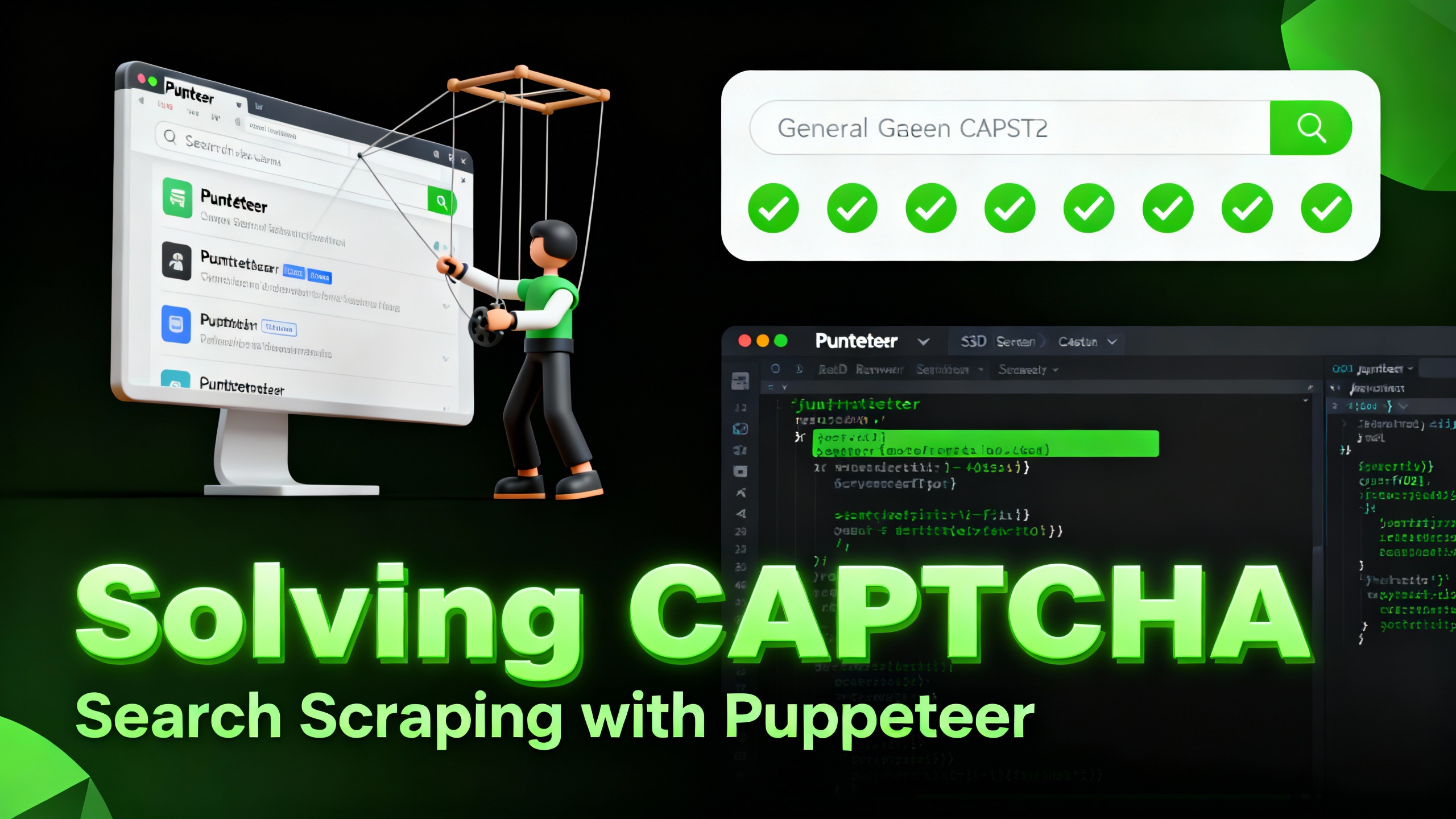
How to Solve reCAPTCHA When Scraping Search Results with Puppeteer
Master the art of Puppeteer web scraping by learning how to reliably solve reCAPTCHA v2 and v3. Discover the best puppeteer recaptcha solver techniques for large-scale data harvesting and SEO automation.

Lucas Mitchell
04-Nov-2025
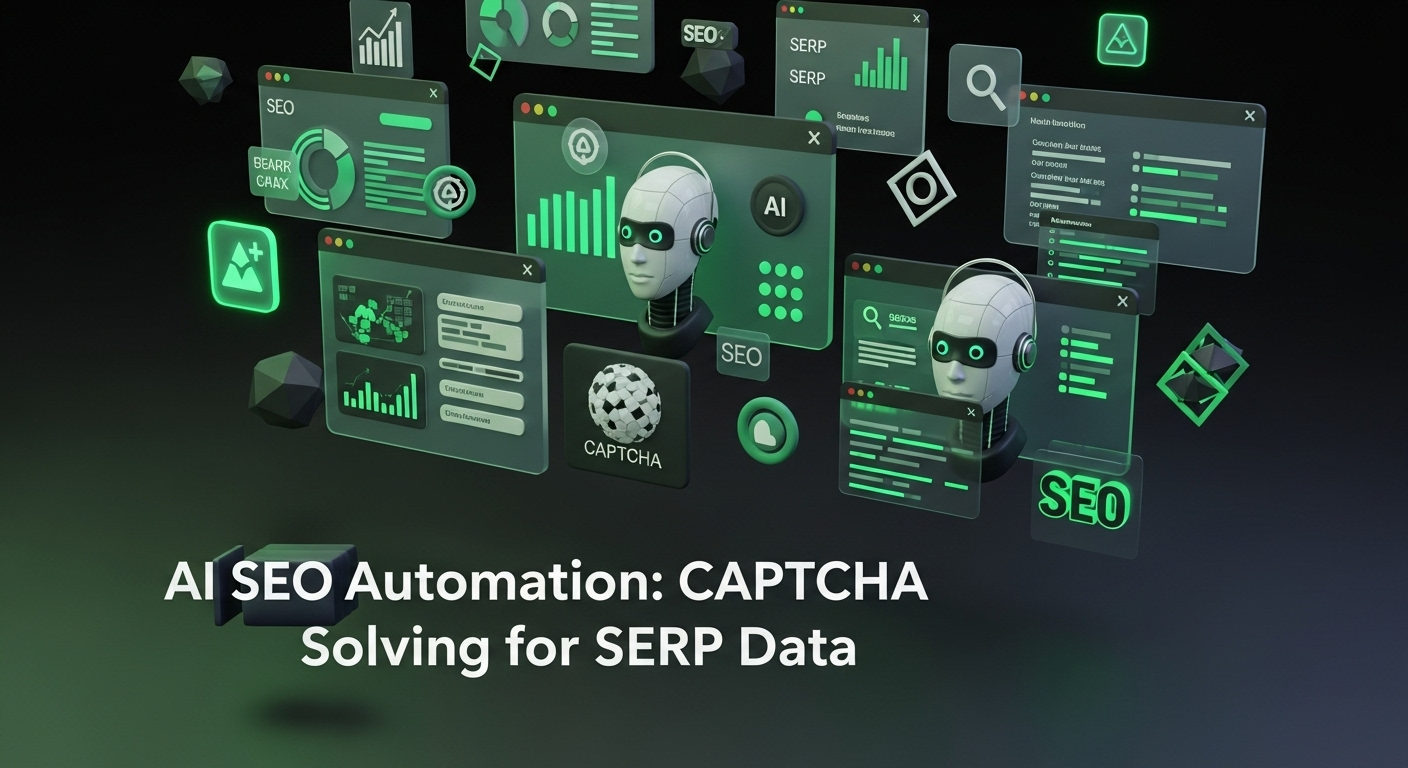
AI Powered SEO Automation: How to Solve Captcha for Smarter SERP Data Collection
Discover how AI Powered SEO Automation overcomes CAPTCHA challenges for smarter SERP data collection and learn about reCAPTCHA v2/v3 solutions

Emma Foster
23-Oct-2025
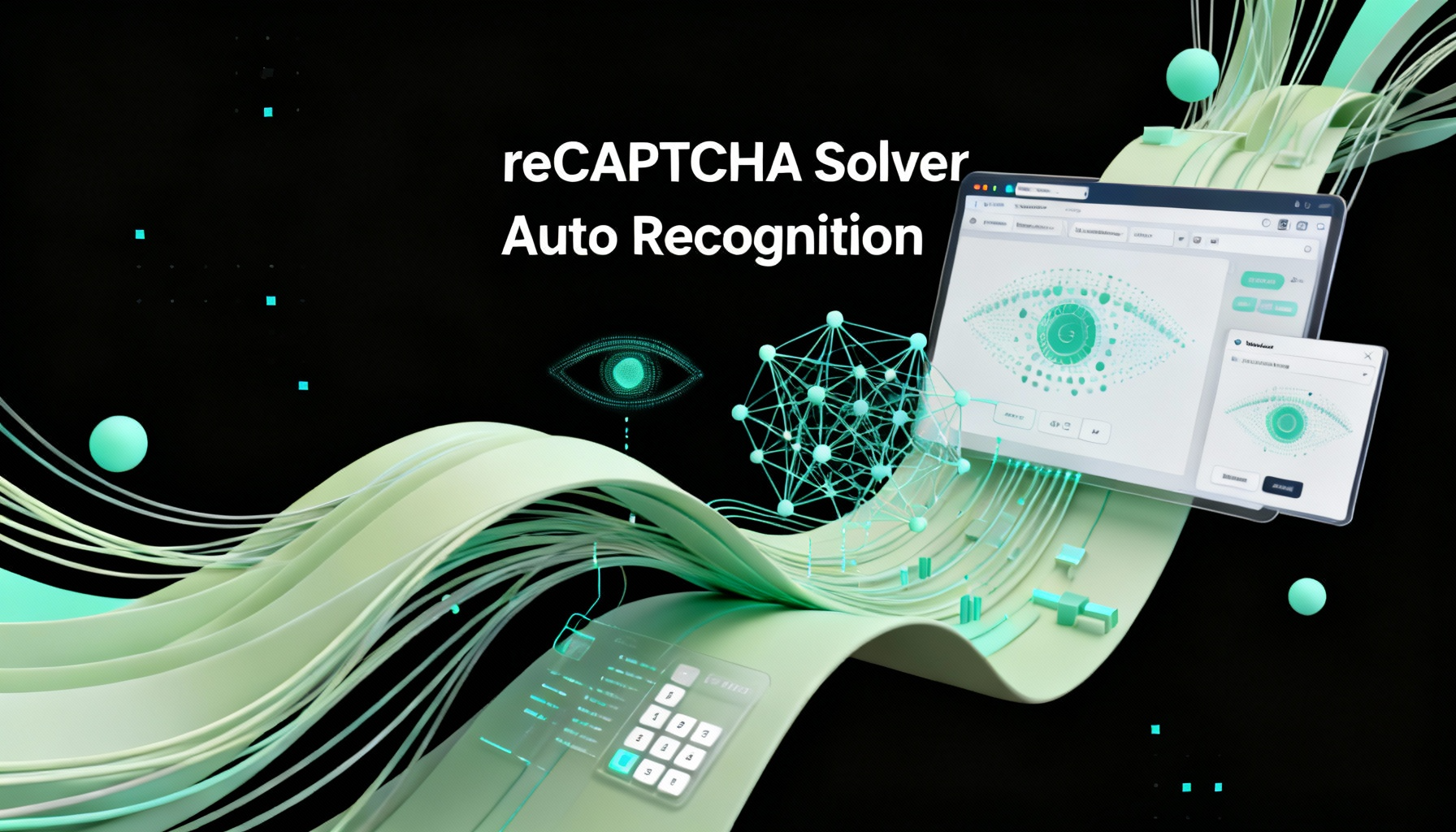
reCAPTCHA Solver Auto Recognition and Solve Methods
Learn how to automatically recognize and solve Google reCAPTCHA v2, v3, invisible, and enterprise challenges using advanced AI and OCR techniques

Sora Fujimoto
22-Oct-2025
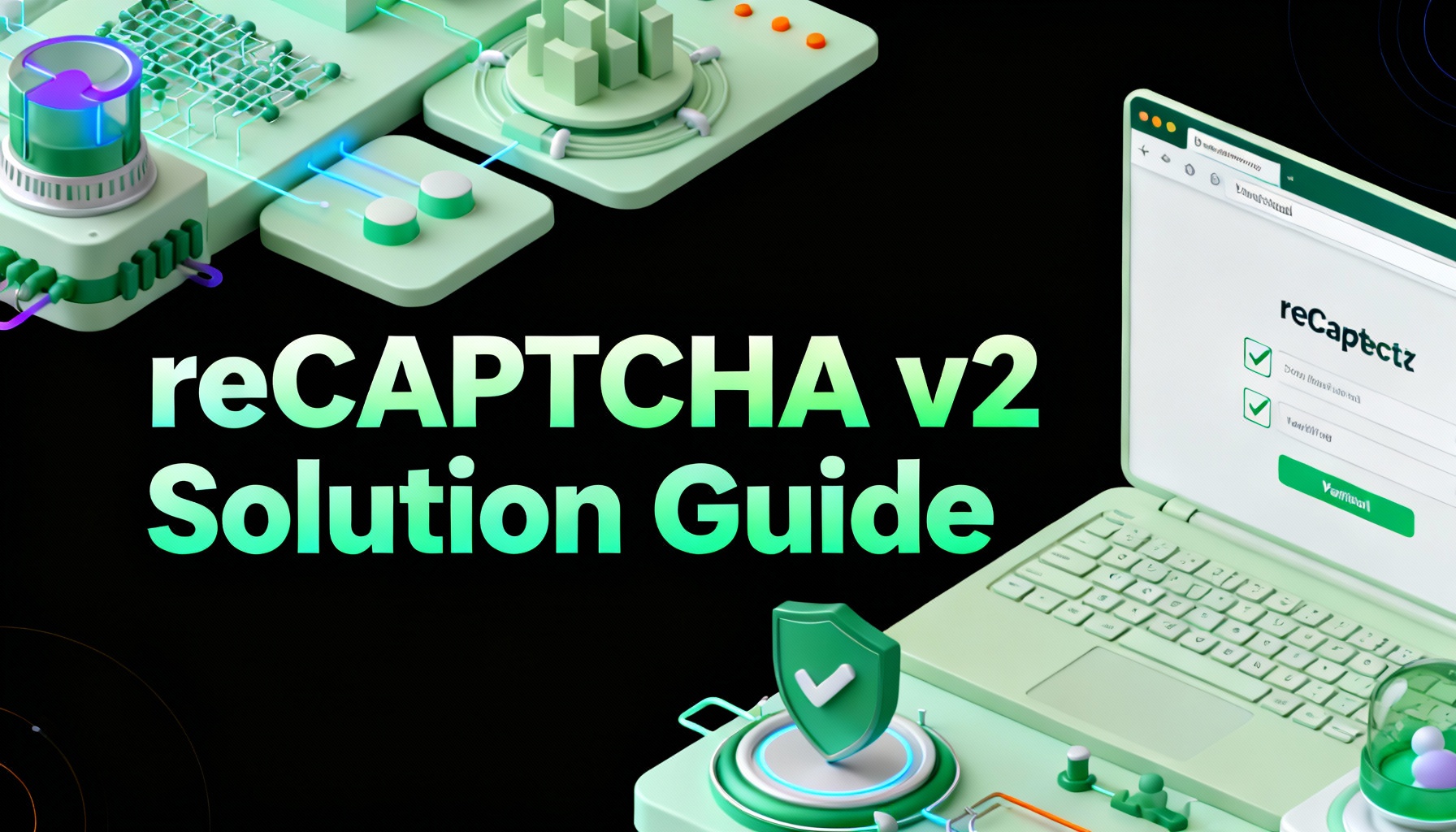
How to Solve reCAPTCHA v2: Solve reCAPTCHA v2 Guide
Learn how to automate solving Google reCAPTCHA v2 using CapSolver. Discover API and SDK integration, step-by-step guides, and bonus codes to streamline captcha solving for web scraping, automation, and development projects.

Aloísio Vítor
21-Oct-2025
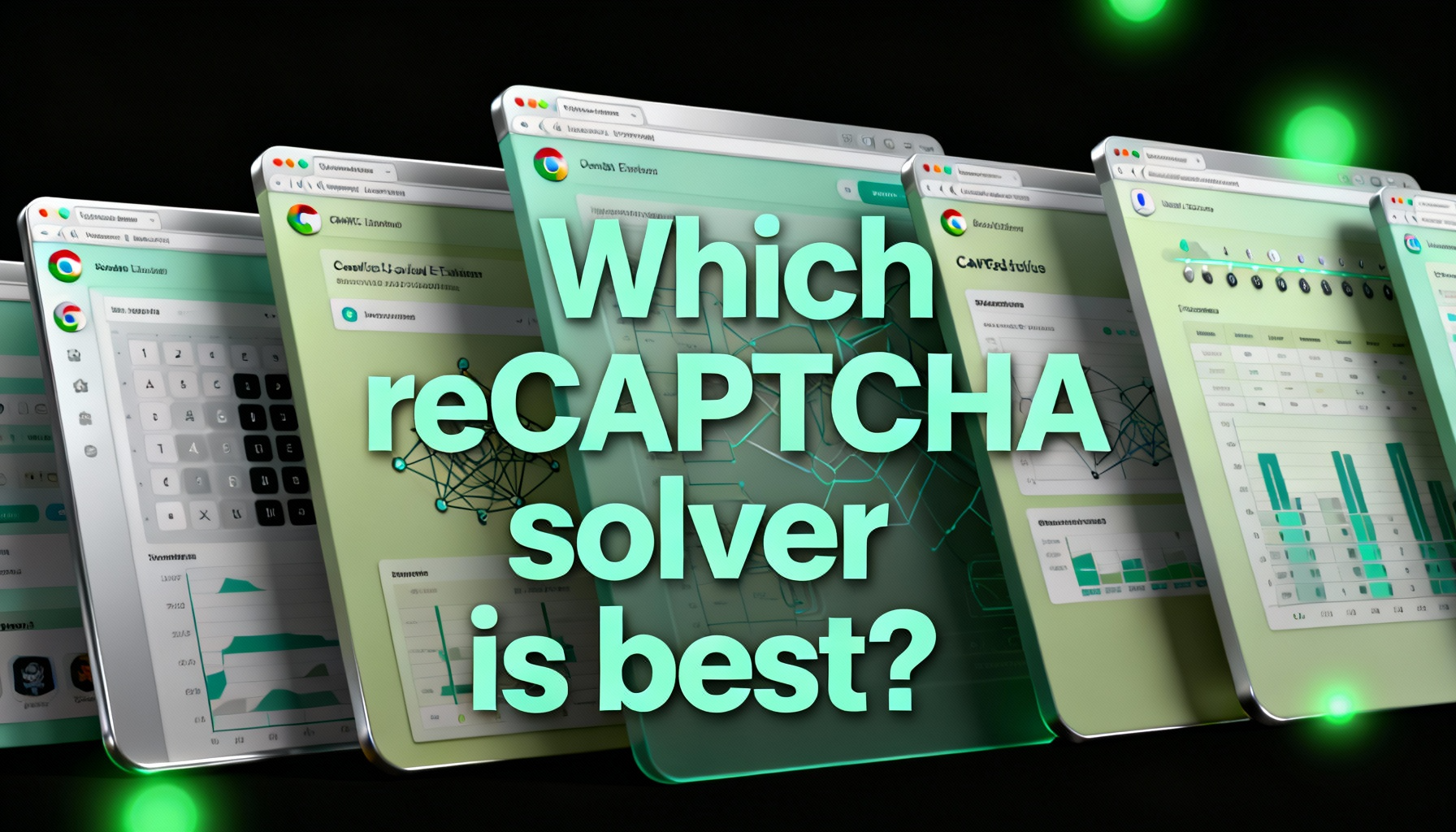
Which reCAPTCHA solver is best? Best reCAPTCHA solver
In this article, we will explore the key factors that determine the effectiveness of a reCAPTCHA solver and highlight why CapSolver stands out as the best reCAPTCHA solver for 2024.

Sora Fujimoto
21-Oct-2025
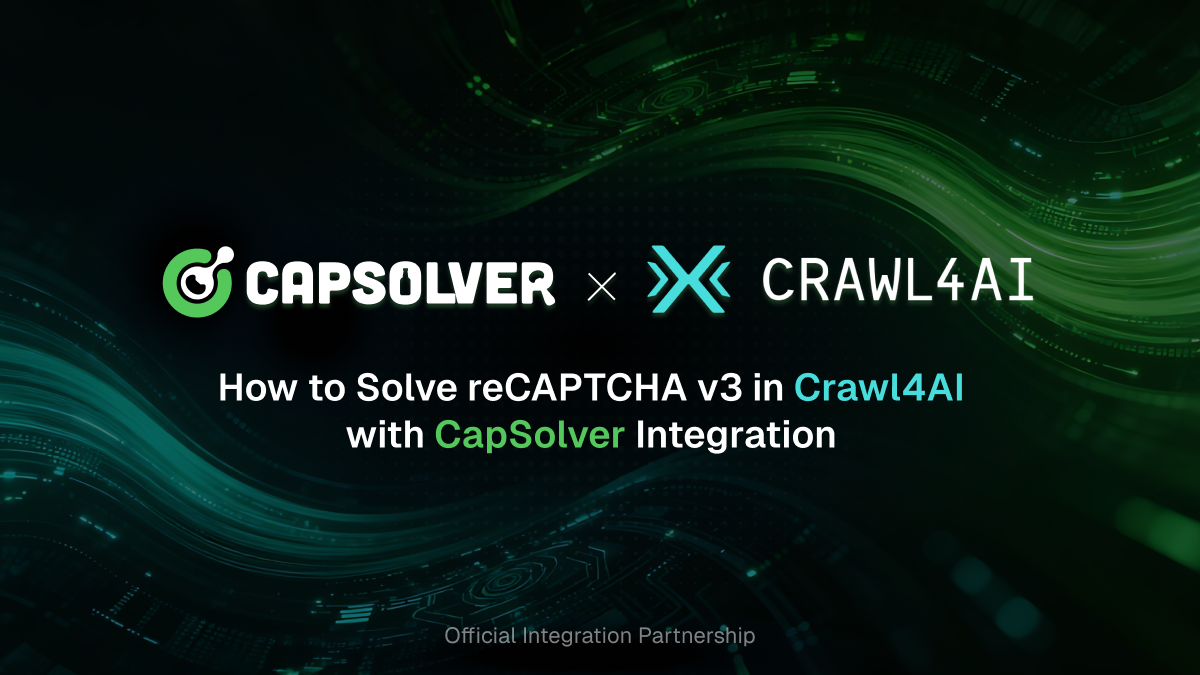
How to Solve reCAPTCHA v3 in Crawl4AI with CapSolver Integration
Solve reCAPTCHA v3 in Crawl4AI with CapSolver — API and extension methods to automate CAPTCHA handling for web scraping.

Ethan Collins
20-Oct-2025


